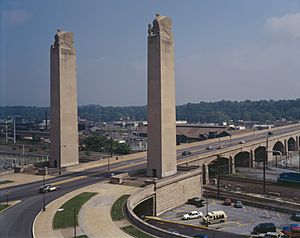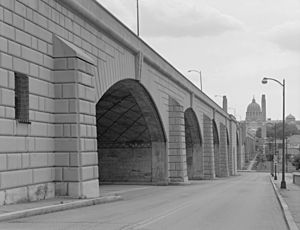State Street Bridge (Harrisburg, Pennsylvania) facts for kids
Quick facts for kids State Street Bridge |
|
|---|---|

HAER photo of the State Street Bridge
|
|
| Coordinates | 40°16′0″N 76°52′42″W / 40.26667°N 76.87833°W |
| Carries | SR 3014 (State Street) |
| Crosses | Amtrak / Norfolk Southern tracks |
| Locale | Dauphin, Pennsylvania, United States |
| Other name(s) | Soldiers and Sailors Memorial Bridge |
| Maintained by | PennDOT |
| NBI # | 223014003001900 |
| Characteristics | |
| Total length | 1,312 ft (400 m) |
| Width | 80 ft (24 m) |
| Load limit | 36 short tons (33 t) |
| History | |
| Designer | William Gehron, Sidney F. Ross |
| Construction end | August 22, 1930 |
| Statistics | |
| Daily traffic | 8,182 (2009) |
| MPS | Highway Bridges Owned by the Commonwealth of Pennsylvania, Department of Transportation TR |
| NRHP reference No. | 88000761 |
| Added to NRHP | June 22, 1988 |
| Lua error in Module:Location_map at line 420: attempt to index field 'wikibase' (a nil value). | |
The State Street Bridge is also called the Soldiers and Sailors Memorial Bridge. It is a large concrete bridge in Harrisburg, Pennsylvania. The bridge is about 1,312 feet (400 meters) long. It crosses over Pennsylvania Route 230 and Paxton Creek. It also goes over train tracks used by Amtrak and Norfolk Southern.
The bridge was finished in 1930. It was meant to be the main way to enter downtown Harrisburg from the east. This included reaching the Pennsylvania State Capitol Complex. The bridge is listed on the National Register of Historic Places. It was added on June 22, 1988.
Contents
Building the Bridge: A Look at Its History
Early Plans for the Capitol Area
In 1897, the original Pennsylvania State Capitol building burned down. After this, people started making plans to make the area around the Capitol much better. They wanted a more impressive Capitol building. This would help Harrisburg keep its place as the state capital. Other cities like Philadelphia were trying to become the capital instead.
By 1916, the state bought the land needed for this big expansion. A designer named Arnold Brunner was hired. He was tasked with planning the new buildings and the surrounding landscape. However, these plans were put on hold because of World War I.
A Memorial Bridge for Soldiers
After World War I ended, a new idea came up in 1919. People decided the new bridge should honor the armed forces of the United States and Pennsylvania. These brave people had fought in the war. The Pennsylvania General Assembly (which is like the state's parliament) passed a law on July 18, 1919. This law allowed the bridge to be built as a memorial.
Arnold Brunner, the original designer, passed away in 1925. So, in 1926, two other designers, William Gehron and Sidney Ross, updated his plans. They made the bridge even bigger. They also designed taller, more modern-looking towers (called pylons).
Construction and Completion
Building the bridge started in September 1925. The General Assembly provided money for the bridge in 1927 and 1929. The city of Harrisburg also gave $300,000. The bridge was officially finished on August 22, 1930.
Later, in 1955, the bridge was updated by J. Richard Nissley. He added a 36-foot (11-meter) steel section to the east end. In 1957, the road and sidewalks on the bridge were replaced. The State Street Bridge was added to the National Register of Historic Places on June 22, 1988.
Bridge Design: Eagles, Arches, and More
The western end of the bridge has two tall towers, called pylons. Each pylon is about 145 feet (44 meters) tall and 16 feet (5 meters) wide. On top of each pylon sits a huge eagle. One eagle represents the United States Army. The other eagle represents the United States Navy. Each eagle is about 21 feet (6.4 meters) tall and weighs around 300 short tons (272 metric tons). A sculptor named Lee Lawrie created these impressive eagles.
Each side of the pylons shows the year of one of eight wars. These were wars the United States had fought in up until World War I.
The bridge has many arches. The center stone of each arch is called a keystone. Each keystone has a carving of a weapon. These weapons were developed and used during World War I.
There were also plans for a museum to be built under the western end of the bridge. This museum was never built. It was meant to display Pennsylvania flags used in battles. It would also list all the Pennsylvanians who fought in World War I.
 | Sharif Bey |
 | Hale Woodruff |
 | Richmond Barthé |
 | Purvis Young |


